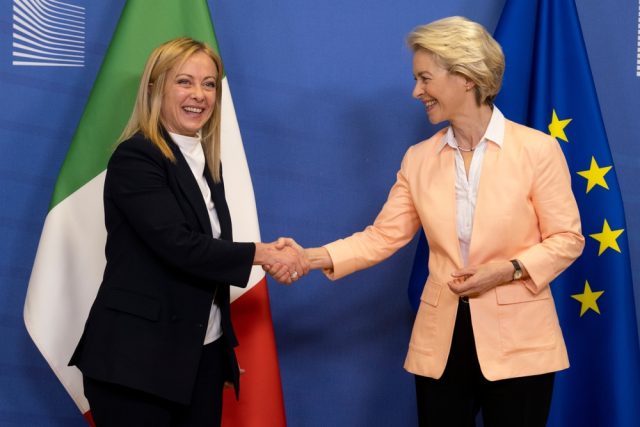
In a tense climate and a complex international situation such as the one we have been experiencing in recent weeks, few European leaders are proving that they have steady nerves and know how to keep the rudder straight in order to achieve the best possible result for their country and for the EU. This is certainly the position that Italian leader Giorgia Meloni has taken in recent days, joined in this process also by European Commission President Ursula Von der Leyen.
THE TWO SIDES OF THE ATLANTIC
First of all, one must take into account – and then analyse – what has been the response to the souring of relations between the US and Kiev in the aftermath of Donald Trump’s meeting with Volodymyr Zelensky, and the cooling of American interest in protecting the European continent from an anti-Russian perspective. Then must also be considered the dynamics triggered by the duties planned by the US President, which could create quite a few problems for some European markets. The logic that moved Meloni on the one hand, and Von der Leyen on the other, was to avoid conflict with the ally so as not to risk a breakup. Of course, Giorgia Meloni’s relationship with Trump helped. Being the only European leader present at his swearing-in was no small thing in diplomatic logic; a logic that today aims to create a narrative to emphasise that the US is not an enemy, but rather an ally stronger than ever with whom one must side and work.
THE CONFLICT IN UKRAINE
It is clear that in the European chancelleries, at the moment, the US position on the conflict in Ukraine and the relations with Russia seems to have become a real watershed. Too much importance is being given to the fact, so that in the international scenario there seems to be a before and an after the meeting between Trump and Zelensky. From the Italian point of view and that of President Von der Leyen, on the other hand, this juncture is seen as a point from where it’s possible to start working again. The objective of the two leaders is certainly to arrive at mitigating the tycoon’s desire to proceed in total autonomy on the issue of the conflict in Ukraine, while at the same time building a European response that can be an alternative to US involvement. So, no easy comments against the position taken by Trump, but only firmness and consistency in recalling the need that, in any case, a fair peace must be achieved for Ukraine.
COMMON DEFENCE
Von der Leyen herself in her speech to the plenary assembly in Brussels, on March 11th, returned to the need for a common defence, emphasising that peace in the European Union is no longer something that can be taken for granted. Here too, however, the problem is not only political, but also economic. The ReArm defence plan, announced by the Commission, is worth around 800 billion euros that the Member States must finance. Naturally, the clash has already begun between the frugal countries, that would not like to pool investments, and the EU members with high debts that would like support so as not to further burden their domestic budgets. In this sense, Italy is seeking further mediation. In fact, Giorgetti has presented to his ministerial colleagues what has been called the ‘European Initiative for Security and Industrial Innovation’. The aim of this plan would be to attract new private capital to Europe, so as not to increase the public debt of the Member States. An initiative that would only work by improving and increasing investment guarantees. It is a complex plan, but one that echoes the Italian government’s idea on the industrial and economic development of the Member States, especially in delicate and strategic sectors such as security. A further piece in the delicate balance being built on either side of the Atlantic, the only uncertainty once again being what – and who – will be the pivot on which this will rest.



 Subscribe
Subscribe